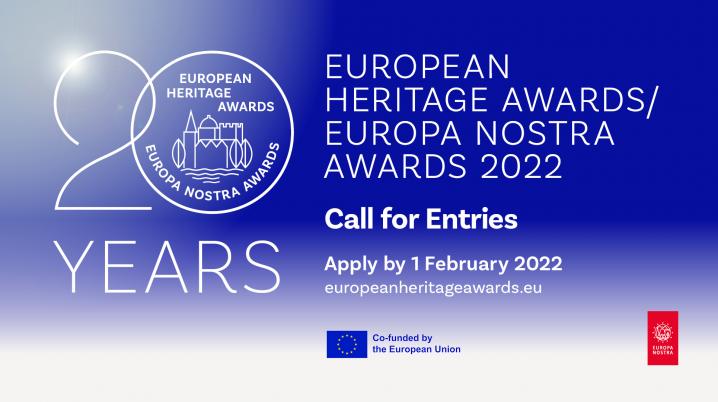
The European Heritage Awards / Europa Nostra Awards 2022 are open for submissions. Architects, craftsmen, cultural heritage experts, professionals, volunteers, public and private institutions, and local communities all can apply. The deadline for submissions is 1 February 2022.
The Awards identify and promote best practices in the conservation and enhancement of tangible and intangible cultural heritage, stimulate the trans-frontier exchange of knowledge throughout Europe, increase public awareness and appreciation of Europe's cultural heritage and encourage further excellent initiatives through the power of example.
As of 2022, the categories of entry have been revised in line with the latest developments related to heritage policy and practice in Europe. The renewed five Awards categories are:
1. Conservation & Adaptive Reuse
2. Research
3. Education, Training & Skills
4. Citizens Engagement & Awareness-raising
5. Heritage Champions
About the Awards
The European Heritage Awards / Europa Nostra Awards were launched in 2002 by the European Commission and have been run by Europa Nostra ever since. They are supported by the Creative Europe programme of the European Union. This year marks the 20th anniversary of Europe's most prestigious Awards in the heritage field.
Previous winners from the Netherlands
Last year, the project Holidays! In the East and West – The School Church was awarded in the Education Training and Awareness-Raising category. This project aims at encouraging children to create a mutual understanding of their own cultural background and that of others by presenting holidays and related traditions of the Christian and Islamic religions.
The transformation of LocHal from the former main workshop of the Dutch Railways into a cultural centre was awarded the European Heritage Award/Europa Nostra Award 2020 in the category of conservation. The Jury stated that “this project is a good example of the repurposing of an industrial heritage building, with the narrative of the railway heritage of the building remaining present. As the building is publicly accessible, it is a meeting point for people and has contributed to the revitalisation of the neighbourhood”.
Scanning for Syria was a pilot research project by Leiden University and Delft University of Technology in partnership with the Catholic University of Leuven and Heidelberg University to support rescue and preservation efforts of their archaeological heritage of Syria during the civil war.
Mr. Don Duco was awarded for his dedicated service to preserving the memory of worldwide cultural heritage activities connected to the use of tobacco and, in particular, the use of pipes. Don Duco has worked on the collection of smoking pipes and tobacciana which is housed in the Amsterdam Pipe Museum since 1969.



